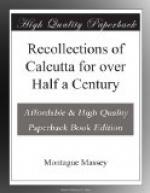EARLY-MORNING RACING.
That term must not be taken in its modern sense, however. If one spoke about “the course” to-day, it would be understood to mean the racecourse, but in those days it meant the venue of the evening drive, There was then, as now, a racecourse in Calcutta, but, though on the present site, it was, as might be expected, nothing like so elaborate. There was only one stand, and that was opposite the old jail; there was no totalisator and no book-makers. The Racing took place in the early morning, from about 7 o’clock till 9 or 9-30. The only public form of gambling on the racecourse then were the lotteries, which were held the night before at the race-stand, and they were quite big ones, numbers of them on each race. In addition, there was, of course, plenty of private wagering between one man and another. Very often in the cold weather racing would be held up by dense fogs so that for a time it was difficult to see across the breadth of the course, the consequence being that we were on those mornings late for office. Even in those far-off days professional jockeys were employed, but principally in the cold weather. The riding at the monsoon meetings was mostly confined to G.R.’s.
SOCIAL AND OTHER CLUBS.
Of other sport there was not much. There was no football, and no tennis clubs; but there were cricket clubs (Calcutta and Ballygunge), and the Golf Club, which had the course and a tent on the site of the present pavilion on the maidan, but there were few members and they used to spend their time sipping pegs and chatting more often than playing golf. Of course, there was polo for those who could afford it, but there was no Tollygunge Club, no Royal Calcutta Golf Club, and no Jodhpore Club.
As regards social clubs, there was the Bengal, which was then very much more exclusive than now, and into which it was difficult to obtain an entrance unless you had been a long time in the city and had a certain standing. The old Qui Hais who were members looked askance at young men. There was also the United Service Club which was at first confined strictly to I.C.S. men and military officers, but subsequently financial considerations led to its being thrown open to members of other services.
[Illustration: Distant view of Race Stands Photo. by Bourne & Shepherd.]
[Illustration: Belvedere]
THEATRICALS WITHOUT ACTRESSES.
In those days, there was no Saturday Club, and we were dependent for our dancing on the assembly balls and private dances; the former used to be held at the Town Hall about once a fortnight. All people of any respectability were eligible to attend, and very pleasant, indeed, these assembly balls were. We used also to have concerts mainly given by amateurs, occasionally assisted by professionals, but there were




